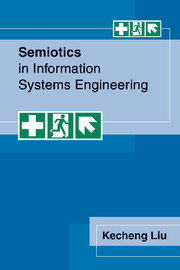Book contents
- Frontmatter
- Contents
- Preface
- 1 Introduction
- Part one Semiotic framework and methods
- 2 Understanding semiotics
- 3 A semiotic framework for information systems
- 4 A semiotic approach to information systems development
- 5 Knowledge representation and information analysis
- 6 Semantic Analysis
- 7 Pragmatics and communication
- 8 The social layer: modelling organisations as information systems
- Part two Applications
- Appendix A Semantic templates and surrogate specification
- Appendix B LEGOL applications in the CRIS case
- Bibliography
- Index
5 - Knowledge representation and information analysis
Published online by Cambridge University Press: 19 September 2009
- Frontmatter
- Contents
- Preface
- 1 Introduction
- Part one Semiotic framework and methods
- 2 Understanding semiotics
- 3 A semiotic framework for information systems
- 4 A semiotic approach to information systems development
- 5 Knowledge representation and information analysis
- 6 Semantic Analysis
- 7 Pragmatics and communication
- 8 The social layer: modelling organisations as information systems
- Part two Applications
- Appendix A Semantic templates and surrogate specification
- Appendix B LEGOL applications in the CRIS case
- Bibliography
- Index
Summary
Information analysis is also called information requirements analysis, or requirements studies. It shares with knowledge representation many fundamental concepts and principles. Similarities are found in techniques and methods for both. They both address how people understand the world and how to represent their understanding. Meaning of symbols and languages used in modelling is a central issue for both.
‘All men by nature desire to know’ – said Aristotle in his book Metaphysics. As an agent experiences in the flux of the world in which he acts, his faculty of sensation enables him to feel and observe affairs around him. His memory helps him to accumulate the observations and from them he learns about the world and knows what he can act upon in given circumstances. Many philosophers and scientists, such as psychologists and linguists, have been preoccupied with the study of knowledge. As computer scientists have joined in the inquiry, new perspectives of the study have been suddenly broadened. Knowledge representation has become one of the most important areas of study, because it is directly related to the exploitation of human knowledge by means of artificial intelligence, (deductive) databases, and other computer-supported methods. Each theory of knowledge (epistemology) presupposes a semantic theory; otherwise knowledge cannot be captured and represented with any language or sign system. Knowledge representation is about meanings, which are relationships between signs and the other things that they stand for.
- Type
- Chapter
- Information
- Semiotics in Information Systems Engineering , pp. 49 - 60Publisher: Cambridge University PressPrint publication year: 2000



